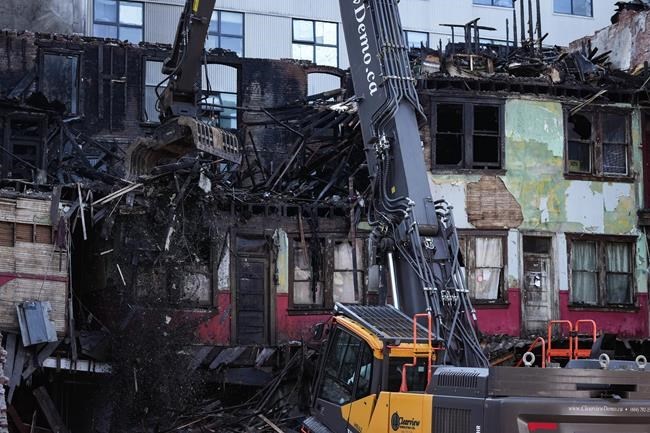VANCOUVER ŌĆö A woman who survived a fatal fire at a downtown Vancouver hotel that was home to about 80 low-income residents has filed a proposed class-action lawsuit against the building's owner, its non-profit operator and the city's fire department.
Plaintiff Jennifer Hansma joined fellow survivors and members of a local housing advocacy group at a news conference on Tuesday, marking the one-year anniversary of the fire that killed two people anddisplaced dozens of others.
Residents had no warnings about the fire, and no means to fight it, the lawsuit says.
The fire alarm and sprinkler systems did not activate because they had not been serviced following a separate fire three days before the fatal blaze, and when residents looked for extinguishers, "all they could find were empty canisters," it says.
After the fire, the claim says many residents were left homeless for days or weeks.
The bodies of two people who died were discovered days after the fire while the remains of the building were being pulled down.┬Ā
The owner of the 110-year-old building and its non-profit manager had failed to ensure fire safety measures were adequate and up-to-date, the lawsuit says, and the city did not enforce safety regulations to the same standards it did elsewhere.
The owner and operator of the Winters Hotel "did not consider the residents to have political, economic or social power," and the city had a similar impression, it says.
That perceived lack of power was a factor in the defendants' failure to ensure the building had adequate safety measures in place, including fire alarms, sprinklers, extinguishers, a fire safety plan and accessible fire escape ladders, it says.
The hotel was in a state of disrepair prior to the fire, it says.
"Fire exits were locked. Some door closers were missing or broken. Holes in walls and ceilings were left unrepaired. Paint was peeling and black mould was growing. Rats were prolific," says the claim filed in sa╣·╝╩┤½├Į Supreme Court last Thursday.
While the first fire days earlier was quickly doused by the sprinkler system and residents using extinguishers, the lawsuit says the fire alarm was not activated.
It says no one took steps to reset the sprinkler or fire alarm systems or replace fire extinguishers before the fatal blaze that destroyed the building three days later.
After the earlier fire, the claim says the city had ordered Atira, the non-profit housing provider that operated the building, to have the fire alarm and sprinkler systems serviced and to establish a 24-hour fire watch until the system was functional.
Atira did not have staff at the Winters Hotel who were properly trained to conduct an effective fire watch, a deficiency the city was aware of, the lawsuit says.
The city met regularly with Atira staff, including a meeting a few days before the fatal fire, it says.
"As a result of these meetings, fire inspections, and attending at (previous) fires, the city was aware that there were unmitigated fire safety hazards in the Winters Hotel."
The claims have not been tested in court and the defendants, the City of Vancouver and Atira, did not immediately respond to a request for comment.
The plaintiff says in a statement that she lost her cat, family heirlooms and a gift from her late mother in the fire, and survivors have waited long enough for answers.
Hansma continues to suffer from psychological injuries, the lawsuit says.┬Ā
The proposed class action seeks general, special, aggravated and punitive damages, including compensation for residents over past and future loss of income and earning capacity, as well as health-care costs.
A few months after the fire, Public Safety Minister Mike Farnworth announced a coroner's inquest into the deaths of the two people whose bodies were found in the rubble, saying a jury would hear from witnesses under oath and possibly make recommendations to prevent similar deaths in the future.
This report by The Canadian Press was first published April 11, 2023.
Brenna Owen, The Canadian Press



